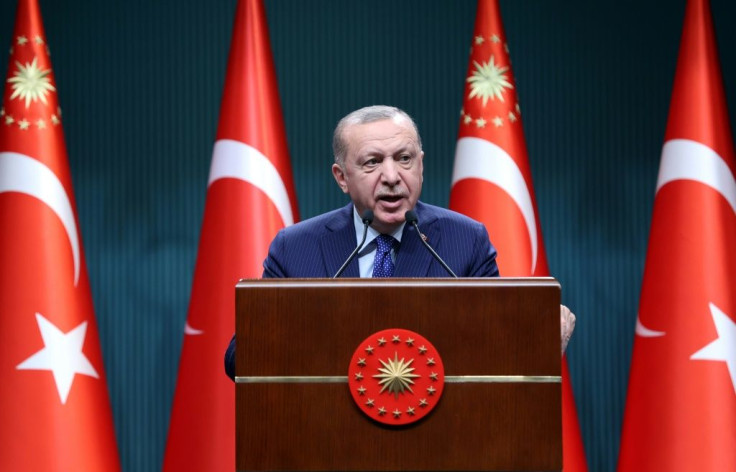EU Chiefs Make Rare Turkey Visit To Revamp Ties
The European Union's top two officials paid a rare visit to Turkish President Recep Tayyip Erdogan on Tuesday aimed at testing his avowed commitment to revamp ties.
Years of disputes over a growing list of issues threatened to boil over last summer when Turkey sent warships to support an energy exploration mission in waters claimed by EU members Cyprus and Greece.
Tensions cooled somewhat when Turkey withdrew the vessels and this year engaged in its first maritime talks with Greece since 2016.
The bloc pulled back from its threat to sanction Turkey as a result.
European Commission chief Ursula von der Leyen and European Council president Charles Michel will now see how Erdogan intends to follow through on his repeatedly stated intention to "turn a new page" in relations.
The talks in the Turkish capital Ankara were their first personal meeting since Erdogan paid a visit to Brussels in March 2020.
The Turks say they want to move forward from "positive" talks held in a series of calls to "concrete action" -- especially on migration.
But EU officials warn that any improvement depends on how Erdogan -- who was leader when Turkey formally opened talks to join the bloc in 2005 -- acts and whether he remains a constructive partner.
The possible thaw coincides with a toughening on Turkey from the White House after the election of President Joe Biden.
The EU is dangling the possibility of visa liberalisation and more money for millions of refugees that Turkey is hosting under a 2016 deal.
But an EU official insisted that Tuesday's meeting "will not be a moment of negotiations" but rather a chance for the sides to lay out their terms for improved ties.

The meeting comes on the heels of Turkey's withdrawal from a treaty combating violence against women and the launch of a formal bid to shut down the country's main pro-Kurdish party.
The decisions put Brussels in a tough spot since EU officials were then in the process of laying the groundwork for Tuesday's meeting in Ankara.
The bloc ended up issuing statements condemning Erdogan's actions but stating that it remains committed to working with Turkey if the "current de-escalation is sustained".
Both EU and Turkish officials say they could be ready to upgrade the customs union they reached in 1995.
A Turkish diplomatic source told AFP that Ankara also expects greater emphasis on Turkey's candidacy status to join the EU and more regular meetings.
Ankara also urgently wants to update an expiring deal the sides struck in 2016 that saw the bloc promise billions of euros in exchange for Turkey exerting control over the flow of migrants and refugees into Europe.
Turkey is now home to more than four million refugees and migrants -- the vast majority of them from neighbouring Syria.
But Brussels accuses Ankara of not following through on its commitment to take back migrants who make it to Europe but whose asylum applications fail.
Erdogan's increasingly assertive foreign policy across the Middle East and the eastern Mediterranean has been a significant source of EU-Turkey strains.
Ilke Toygur of the German Institute for International and Security Affairs said Turkey felt the West's influence was waning and was preparing for a "more multi-polar, more divided" world.
But Turkey has been reaching out in the past few months to its neighbours and both sides are now focusing on UN-led exploratory talks over the divided island of Cyprus scheduled for later this month.
Cyprus has been a thorn in relations since Turkey occupied the island's northern third in 1974 in response to a coup orchestrated by the military junta then in power in Athens aimed at annexing the island to Greece.
© Copyright AFP 2024. All rights reserved.





















